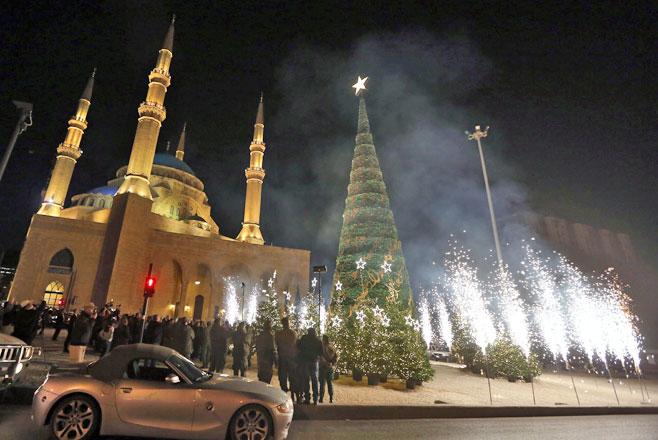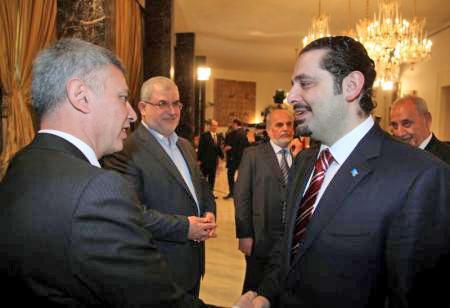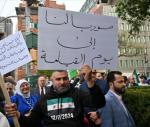You are here
Lebanese politician casts doubt on presidential deal
By Reuters - Dec 08,2015 - Last updated at Dec 08,2015
BEIRUT — Talks aimed at ending Lebanon's 18-month-long presidential vacuum are not going smoothly, a Christian leader said on Tuesday, casting doubt on the outlook for a power-sharing proposal aimed at reviving the paralysed government.
The proposal tabled by Sunni Muslim politician Saad Al Hariri marks the most serious effort yet to resolve a political crisis that has been exacerbated by region-wide conflict.
Under the plan, Hariri would become prime minister, while Suleiman Franjieh, a friend and ally of Syrian President Bashar Assad, would become Lebanese head of state.
A senior member of Hariri's Future Movement has warned that the alternative to the deal could be civil strife.
The prospects of a deal seemed good last week when both Iran and Saudi Arabia, regional powers that are in conflict across the Middle East, expressed their support for a settlement in Lebanon. Both wield influence over rival Lebanese factions.
But former president Amin Gemayel said there were no "ready solutions" to the crisis after he met Michel Aoun, a veteran Christian politician whose blessing is seen as crucial to concluding the deal.
"It appears that matters are not going very smoothly at the current time. We have a responsibility as Lebanese leaders in general, and as Christians in particular. We cannot leave the country to stumble in this way," Gemayel said.
Political rivalries have caused almost complete deadlock in Lebanon's sectarian-based system of government. The current prime minister, Tammam Salam, heads a Cabinet of national unity that has failed to take even the most basic decisions.
Aoun, who himself covets the presidency — which in Lebanon is reserved for a Maronite Christian — is seen as vital to the success of any deal due to the support his candidacy enjoys from the powerful Shiite group Hizbollah, which is backed by Iran.
Hizbollah has stuck by its support for the 80-year-old Aoun despite its close relationship with Franjieh. The group has made clear it will not force Aoun to give way to Franjieh.
Even with regional backing, the deal must also overcome rivalries among Christian leaders.
Aoun's party won more seats in parliament than any other Christian in the country's last parliamentary election, held in 2009. Since then, parliamentary elections have twice been delayed and parliament has extended its own term.
The Lebanese political system apportions government on a sectarian basis. The presidency is reserved for a Maronite Christian, the post of prime minister goes to a Sunni Muslim, while the speaker of parliament must be a Shiite.
‘Golden opportunity’
Lawmaker Ali Khreis, a member of the Amal Movement led by Parliament Speaker Nabih Berri, said the Franjieh proposal was still serious, but "it has not yet been decided".
"We have a golden opportunity to get out of the crisis of the presidential vacancy and if we don't seize it there will be no president for one year or two years," he told Sawt El Shaab, a Lebanese radio station, on Tuesday.
"The terms of the settlement are not yet mature," he added, saying there would be no deal before December 16, when parliament is next due to convene with the aim of electing a president.
More than 30 such previous sessions have failed to elect a president. Any power-sharing deal is expected to include an agreement on a law for parliamentary elections.
Ahmad Al Hariri, the senior official in the Future Movement, said failure to strike a deal risked triggering violence in a country still rebuilding from its 1975-90 civil war.
"If the initiative fails to reach a settlement and the vacuum continues for a number of months, the president of the republic will not be elected easily, but will be elected through blood," said Ahmad Al Hariri, a cousin of Saad.
"Do we want to repeat a second civil war?"
Related Articles
BEIRUT — Former Lebanese prime minister, Saad Hariri, said on Sunday he would continue to pursue a power-sharing solution to the country's 1
BEIRUT — Lebanon's political crisis has taken a dramatic turn with the possibility that a friend of Syrian President Bashar Assad could beco
Beirut — Lebanon's powerful ex-premier Saad Hariri is expected to endorse Hizbollah ally Michel Aoun for president, a post that has been vac

















